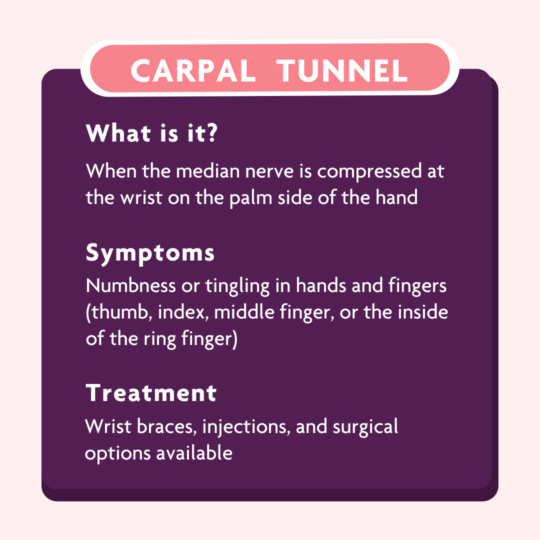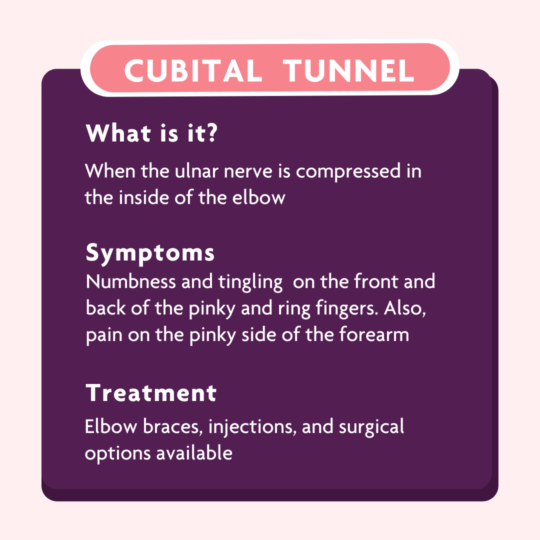Numbness and tingling in the hands and fingers are a common reason people see a hand specialist, often caused by Carpal Tunnel and Cubital Tunnel. Orthopedic hand surgeons are specialists in diagnosing and treating these conditions, which are most commonly the result of nerve compression in the wrist or the elbow.
Carpal Tunnel Syndrome

What is Carpal Tunnel?
The carpal tunnel is an area of the wrist where the carpal (wrist) bones come together and form the floor and sides of the carpal tunnel. Several important tendons that are responsible for flexing your fingers and thumb travel through that tunnel. Near the top of the tunnel, the median nerve travels through this tunnel along with the flexor tendons and is covered by the transverse carpal ligament, which is a thick band of tissue that forms the roof of the tunnel. Normally, the transverse carpal ligament does not cause any issues and is there to help guide the important structures as they pass the wrist. However, if the ligament becomes thickened and if the contents of the carpal tunnel become inflamed, this puts extra pressure on the median nerve. When that happens, it causes compression of the median nerve and that is when people can experience the numbness and tingling sensations.
Carpal Tunnel Symptoms
The most common cause of numbness and tingling in the hand and fingers is carpal tunnel syndrome. In this condition, the median nerve is compressed at the wrist on the palm side of the hand. People usually notice numbness or tingling in the thumb, index, middle finger, or the inside of the ring finger (the side closest to the thumb). Often, people complain about numbness or tingling when their hands are raised – activities such as driving or holding a cell phone to the ear can be a trigger. Individuals also can wake up at night with dense numbness or tingling in their hands and feel like they need to shake them out or they feel as if their hands are swollen—some even describe that their fingers “feel like sausages”. This numbness and tingling happens when the median nerve is compressed and cannot send normal signals.
Several conditions may predispose an individual to developing carpal tunnel syndrome, however, it should be noted that carpal tunnel is a condition that can affect anyone. Some conditions that may put an individual at higher risk of developing carpal tunnel syndrome are pregnancy, trauma causing fractures or dislocations of the wrist, hypothyroidism or other metabolic conditions, rheumatoid arthritis, and diabetes
Treatment Options for Carpal Tunnel
The severity and the duration of the symptoms will dictate what type of treatment your doctor will recommend, but there are several options for treating carpal tunnel. Bracing the wrist typically at night holds the wrist in a neutral position and can reduce the pressure within the carpal tunnel and that, in turn, reduces the pressure on the median nerve and may help relieve symptoms both at night as well as during the day. Sometimes bracing is used in conjunction with steroid injections. A steroid can help decrease the swelling or inflammation of the contents within the carpal tunnel. This can decrease the pressure in the carpal tunnel and take pressure off of the median nerve. If these conservative treatments don’t alleviate the symptoms, it may be time to consider surgery to release the tunnel. This is a relatively straight-forward surgical procedure where you go home the same day. During this procedure, the surgeon releases the transverse carpal ligament that forms the roof of the carpal tunnel and thus releases pressure on the median nerve in an effort to restore the nerve signals and relieve the symptoms.
Cubital Tunnel

What is Cubital Tunnel?
Cubital tunnel is another common cause of numbness and tingling in the hands. In this case, the site of the nerve compression is in the inside of the elbow and the nerve that is compressed is the ulnar nerve. The cubital tunnel is located in the inside of the elbow and when you hit your “funny bone” you are actually hitting the ulnar nerve. The ulnar nerve runs through this tunnel and when this nerve is compressed individuals can have pain down the pinky side of the forearm and hand. The sensation of numbness and tingling occurs on the front and back of the pinky finger and the ring finger. Compression of the ulnar nerve can also affect some of the muscles of the forearm as well as many of the small muscles of the hand known as intrinsic muscles. As compression of the ulnar nerve continues over time, this can lead to dysfunction of the hand with weakness and dexterity issues.
Cubital tunnel is also caused when the structures in the tunnel become inflamed or thickened and put more pressure on the nerve as it runs through the tunnel. Deep flexion in the elbows or keeping the elbows bent can cause irritation to the ulnar nerve.
Treatment Options for Cubital Tunnel
Treatment for Cubital Tunnel usually starts with night bracing to limit the ability to flex or bend the elbow while sleeping. This removes the some of the tension on the ulnar nerve where it runs through the cubital tunnel. Again, if conservative options are not effective at relieving the symptoms, surgery may be needed to release the pressure on the ulnar nerve. This is known as a cubital tunnel release. This surgery involves opening the cubital tunnel to release pressure on the ulnar nerve and may involve moving the nerve to the front of the elbow. In cubital tunnel surgery patients also go home the same day.
When to See a Hand Surgeon
While numbness and tingling in the hands is common, if left untreated over a long period of time, it can have a negative long-term impact. Some of the changes in sensation are reversible if addressed in a timely fashion. However, if nerve compression is allowed to go on for an extended time the nerve may undergo damage and changes that become irreversible. See a hand surgeon if you have these issues so that you can be evaluated. Releasing the pressure on the nerve will not only improve symptoms, but when you catch it early individuals can avoid lasting problems.
